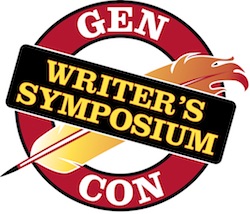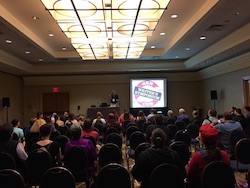
(You know, in addition to the twelve hundred other things you need to keep in your brain.)
So, you’ve volunteered—or perhaps you’ve been volunteered—to run a writer’s convention. These type of cons come in all shapes and sizes—everything from big house parties to relaxicons to cons-within-a-bigger-con, like the writing tracks at Dragon*Con or Writer’s Symposium at Gen Con. No matter the size or shape, here are five things to keep in mind when building your program.
1. Why are you doing this thing, anyway?
A mission statement is just that: a clear, concise statement written by the head honchos about their desire and intent for the company/event/organization. Mission statements help distill the focus of an organization and, in theory, makes decision-making easier. One of the first things you’ll need to do while pondering an event is to understand why you are doing the thing. The heart of the Writer’s Symposium at Gen Con has always been “helping writers write.” For Melanie and me, that encompasses everything from the nuts-and-bolts of world-building, to writing with a day job, to finding an agent, to managing a long-term career. Our attendees run the gamut from people who have the desire to write but have never tried it all the way, to writers with multiple book deals under their belts. There is always something to learn in this industry, and we strive to provide that knowledge to people of all experience levels.
2. Who are you doing this for?
Ah, right. The attendees. Are they younger authors without any publishing credits? Older authors with several book deals? Are they there mainly to network with other authors? Or are they there to learn more about their craft? Learning about the wants and needs of your attendees goes a long way toward building your program and inviting great panelists to bring that program to life.
Since the Writer’s Symposium is hosted by Gen Con, one of the largest game conventions in the world, our audience is comprised mostly of people who enjoy playing games of all sorts. They’re fans of genre fiction, particularly fantasy, science fiction, and horror, and they represent the entire spectrum of age, gender, sexual orientation, and race. We keep this in mind as we build our schedule. We include panels that discuss fantasy creatures, the realities of space travel, and the conventions of epic fantasy novels. In addition, each year, the Symposium includes programming for game writers, screenwriters, and comic writers. While some topics are universal, of course, our program looks different than say, one for romance authors or children’s fiction authors. But because some topics overlap, we do have some programming that touches on romance and kid lit. It all depends on what works and what doesn’t, and it’s always good to pay attention to feedback. Remember, without attendees, there is no convention!
3. Once you’ve made a panel, assign a great person to run it.
Moderators are the unsung heroes of conventions. They are the conduit for all the conversation that happens in the room. They ask questions to their fellow panelists, they help corral the discussion when it gets off track, and control the flow of audience questions to the panelists. They also control potentially bad situations—an indignant attendee or a panelist who refuses to yield the floor, for example—and keep them from spiraling out of control. Great moderators are the backbone of a convention. Appoint them wisely, and consider writing up a guide to help them know how to handle situations consistently and to know exactly what is expected of them. Also, don’t force people to be moderators who might not be comfortable with the job, and don’t just leave the job to chance. A moderator, in a big way, controls the flow of information from the panelists to the audience. You want to make sure your audience gets as much useful information about the topic of the panel as possible, and you definitely don’t want your panels becoming an author self-promo show.
At the Writer’s Symposium, we have a list of “approved” moderators, folks who have proven themselves over the years to be great at the job. We give them training materials every year, and take pride in the fact that, after every Symposium, we receive compliments on how smoothly our panels usually run. We attribute this to our excellent moderators.
4. Variety is the spice of life (diversity is important!)
Creating programming that is diverse and representative is not something that just happens by accident. Even a coordinator with the best of intentions can end up with a program that didn’t quite meet her initial vision. This can happen more easily than one would think, for several reasons. A program can fill with people before a con director even has time to count badges, simply because there are so many awesome creators out there, and those people and what they represent don’t always match what’s best for the convention. One way to counter this is to go into your invitation process with a plan. Know before you go in what your goals are. If you have a plan, things are less likely to go by chance, and you will have more control. Make conscious choices when you accept someone into your program and don’t be afraid to say no or tell someone that you’ll be glad to have them in a future year. This is true for gender/race/etc, but is also true for the types of authors, whether they are indie pubbed or traditional, what genre they write in, whether they are newer or more experienced, and even people’s tones on social media and other places. You want programming that will be the best for your convention and its attendees. This won’t be the same from convention to convention, and that’s why it’s important to refer back to #2, knowing who this convention is for. Set up your guest list and program with intention.
5. Treat your volunteers well.
It’s really easy, in all of the hustle and bustle of the convention, to forget that there are OTHER people there working their butts off to make the program run smoothly. These are your volunteers, and no convention would be complete without them. They help lines run smoothly, help people find what rooms they belong in, provide valuable feedback to directors from attendees, let moderators know when the panel’s time is almost up, greet attendees, and in general, they help make sure everyone has a good time. But convention resources can be thin, and not every convention can treat their volunteers to free rooms or food, etc. How can a smaller convention be sure their volunteers know how valued they are? Well, first, respect their time and energy. Volunteers get tired, too. Try to make sure you have enough volunteers that no one is being run ragged. TELL them they are doing a great job, take a couple seconds out of your day to make sure they know that you value their work and efforts. Volunteers mess up sometimes—remember that they are trying to help and that if they weren’t there, you’d be doing their job yourself, or it wouldn’t be getting done at all. Be kind. At the same time, have a vetting process for your volunteers to make sure they are a good match for the program to begin with. This will reduce the chance of things going wrong. Make sure they have opportunities for breaks throughout the day and find out what their favorite parts of the program are. Do they have a favorite author? Why not make an opportunity for them to meet? Make their volunteer experience special and they will rise to the occasion.
Focusing on these five things will help any con director/coordinator plan a wonderful event that will be a fun and valuable experience for all, but there is one more very important thing to remember when planning a big event, a lesson learned from early Zelda days: “It’s dangerous to go alone!” You should never have to do something as huge as planning a convention yourself. Everyone needs a buddy to not only help with the workload but to serve as support for each other and keep things sane (or so you at least know you have a partner in the INsanity). If you have a partner, you have back-up if you are sick or if some emergency comes up. You have someone to bounce ideas off of, you have someone who can say, “No, that’s a bit out there,” or “Yes! That’s an awesome idea!” You have someone to help you not panic when things get hairy (and they will!). And in the end, you have someone to celebrate with when things go well.
We hope these suggestions are helpful to folks who are planning a convention or other event and perhaps inspiring to those who have thought about starting their own event but didn’t know where to start.












